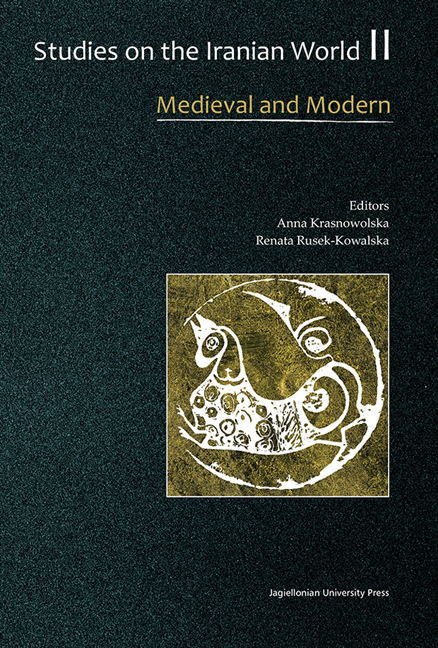Book contents
- Frontmatter
- Contents
- Foreword
- Linguistics
- Literature
- Religion
- History
- Arts
- Social and Cultural Studies
- Amulets and Medical Cures in the Yaghnob Valley: an Overview of Yaghnobi Traditional Medicine between Magic and Healing Folklore
- Persian Cookbooks, the ‘Myth’ of National Cuisine and the Process of Modernisation
- Modernity and Fertility Decline in Iran
- Medicine and Anthropology: the ‘Ambassador-Physician’ Jacob Eduard Polak (1818–1891) as a Mediator of Modernity in Iran
- Anatomy and Therapy of Eye-Diseases in Esmā῾īl Gorgānī Compared to Syriac Sources
- The Trans-Iranian Railway – History and Socio-Political Implications
- Traditional Diet and Allopathic Medicine in Diagnosis and Treatment in Iran
Traditional Diet and Allopathic Medicine in Diagnosis and Treatment in Iran
from Social and Cultural Studies
Published online by Cambridge University Press: 12 January 2018
- Frontmatter
- Contents
- Foreword
- Linguistics
- Literature
- Religion
- History
- Arts
- Social and Cultural Studies
- Amulets and Medical Cures in the Yaghnob Valley: an Overview of Yaghnobi Traditional Medicine between Magic and Healing Folklore
- Persian Cookbooks, the ‘Myth’ of National Cuisine and the Process of Modernisation
- Modernity and Fertility Decline in Iran
- Medicine and Anthropology: the ‘Ambassador-Physician’ Jacob Eduard Polak (1818–1891) as a Mediator of Modernity in Iran
- Anatomy and Therapy of Eye-Diseases in Esmā῾īl Gorgānī Compared to Syriac Sources
- The Trans-Iranian Railway – History and Socio-Political Implications
- Traditional Diet and Allopathic Medicine in Diagnosis and Treatment in Iran
Summary
SUMMARY
Traditional conceptualizations of health and disease in Iran are based on the Galenic notions of the ‘humors,’ ascribe therapeutic efficacy to dietary and herbal interventions, and invest the individual ‘constitution’ with the ultimate authority for judging whether a particular therapeutic course is beneficial. Juxtaposed to this is allopathic medicine, which is based on universalizing assumptions about the nature of the human body and on statistical ‘proof’ of the efficacy of pharmaceutical interventions. Although philosophically at variance with one another, in Iran the two systems have become a syncretism, in which allopathic doctors openly accept Galenic principles, occasionally even making these the basis of their treatment recommendations, while arguments using allopathic concepts such as ‘metabolism’ and ‘antitoxins’ give authority to dietary or herbal treatments.
In Iran, customary habits of food and diet are integral to understandings of health and well being, furnishing explanations for states of health and guidance for prevention and treatment of health problems. These traditional conceptualizations of health, disease and therapy are materially, practically and epistemologically at variance with allopathic medical philosophies. Medical pluralisms exist all over the world, and by now every indigenous culture has had to come to terms with allopathic hegemony. While Iranians would argue that, in Iran, the two systems represent a true pluralism, or two fields of knowl- edge that are distinct and separate, and that patients can choose for themselves whether to follow allopathic or traditional advice, I argue that, at a fundamental level, the practice of medicine in Iran is a syncretism of allopathic and traditional concepts. Allopathic medicine answers to Iranian common sense and thereby becomes adapted to traditional conceptualizations of the body, health and disease.
Traditional medicine in Iran generally is comprised of two tightly related systems. One is derived from the Galenic notion of the ‘humors,’and pays attention to maintaining balance between various dichotomous conditions in the body, most prominently ‘hot’ (garm) and ‘cold’ (sard). The other, related to the humoral theory but not entirely corresponding to it, can loosely be called ‘herbal.’ This revolves around qualities inherent in foodstuffs other than their ‘hot’/garm or ‘cold’/sard properties, and requires particular and detailed attentiveness to diet.
- Type
- Chapter
- Information
- Studies on the Iranian WorldMedieval and Modern, pp. 357 - 366Publisher: Jagiellonian University PressPrint publication year: 2015

